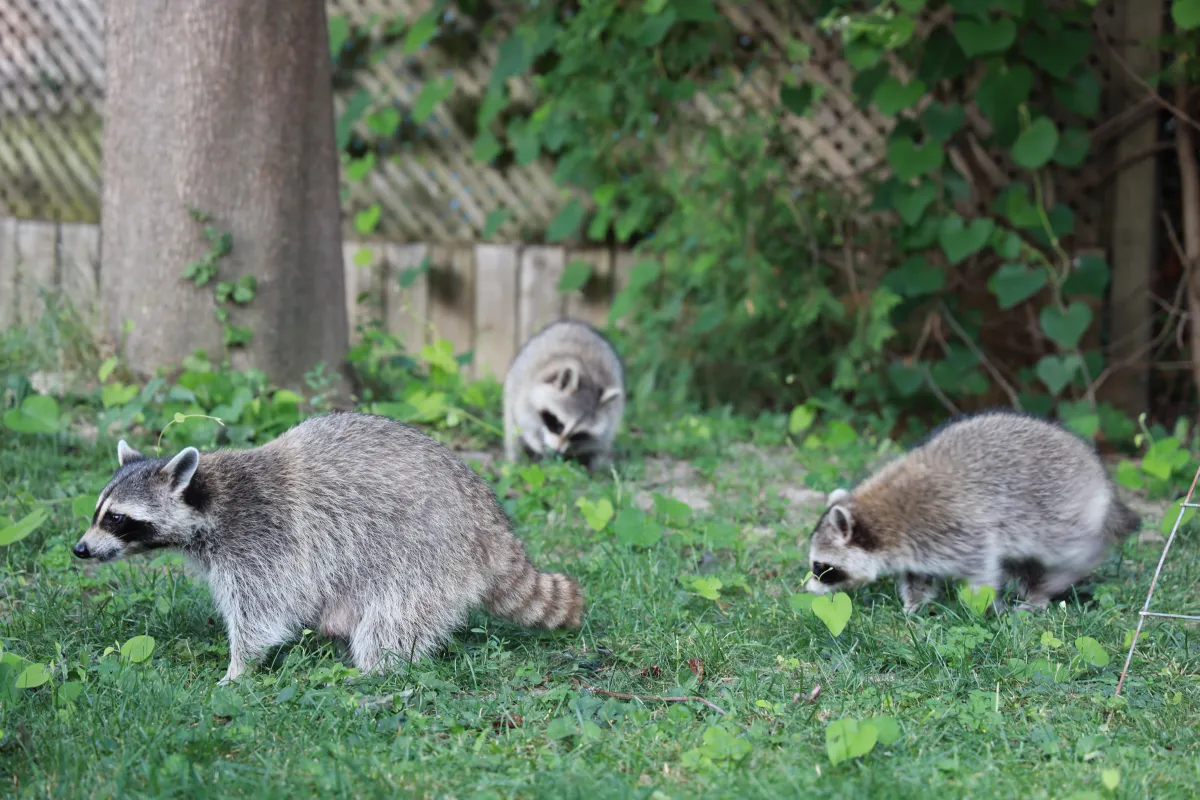Blog
Explore insightful and informative pest control blogs

The Secret Life of Raccoons: Insights into Their Habits and Behaviors
Raccoons are fascinating animals that have adapted to living in a variety of environments. They are native to many areas of North America and are often found in wooded areas, near rivers and streams, and even in urban settings. Raccoons possess an impressive array of physical and behavioural adaptations which make them interesting to study. Their most distinctive feature is their facial mask which helps them blend in with the environment. Raccoons have also developed a well-adapted sense of touch, allowing them to explore their surroundings with greater confidence. They use their front paws as hands, enabling them to open containers and hunt for food among other adaptive behaviours. Raccoon populations are easy to monitor because they are diurnal animals – meaning they are active during the day – so they can be easily observed by researchers. Their behaviour is also highly adaptable and they can learn quickly; making them an ideal species for studying animal cognition. Additionally, raccoons display complex social structures including unidirectional dominance hierarchies which provide insight into social behaviour in species.
misconceptions about raccoons
Raccoons are highly misunderstood creatures. People often regard them as pests — animals that destroy gardens and trash bins, carry diseases, and make a nuisance of themselves. However, this is not the full story. In fact, raccoons have many admirable qualities which make them unique among wild animals. For example, raccoons are incredibly intelligent. Their problem-solving skills are on par with some primates and have amazed researchers for years. They use tools like sticks or rocks to forage for food, and their dexterous paws enable them to open doors, jars, and lids with remarkable agility. It is even said that raccoons can remember solutions to puzzles they've encountered before! Another point that tends to be misunderstood about raccoons is their diet. Though it's true that they like scavenging through trash cans looking for scraps of food, they also eat lots of fruits and vegetables as well as fish, insects, eggs, rodents and other small animals. As such, they play an essential role in controlling populations of animals deemed as pests by humans. In addition to this, raccoons are actually quite sociable animals who live together in colonies and help each other out

Importance of understanding the secret life of raccoons
Understanding the secret life of raccoons is an important part of getting to know these fascinating creatures. Raccoons are highly intelligent and resourceful animals, often capable of outsmarting humans if they are given the right environment and opportunities. They are also incredibly adaptable and can live in a number of different habitats, as long as they have access to food and shelter. By understanding their secret lives, we can gain insight into how they interact with their environment, what kinds of behaviors they exhibit, and how best to ensure their survival in urban or suburban areas. Learning about raccoons' natural history is particularly important if you’re living alongside them, since it will help you recognize potential signs of danger. It can also help you develop strategies for keeping them away from your home or property—such as blocking off potential entry points in your yard—and create humane solutions for dealing with conflicts that may arise when interacting with wild raccoons. Moreover, understanding raccoon behavior can provide insight into other wild animal species and how we interact with them by helping us to understand their needs, instincts, and evolutionary adaptations. For example, discovering why raccoons choose certain den sites or foods could give us
The Habits of Raccoons
Raccoons are omnivorous animals and their diet consists of a variety of food sources. They have been known to eat frogs, fish, fruits, eggs, insects, small mammals such as mice and voles, and birdseed. Raccoons also enjoy eating garden vegetables like spinach and cabbage, as well as acorns, nuts, and corn. In addition to these food sources raccoons will readily accept pet food left out by humans. Raccoons’ diet is largely seasonal-based; in the spring and summer months they can be found foraging for various fruit items such as cherries, blueberries and apples. During winter months when fruit is scarce they rely more heavily on proteins from eggs or small mammals found in wooded habitats. Young raccoons generally feed on invertebrates like earthworms or crayfish until they are old enough to forage for larger items. When living in residential areas or close to humans it’s not uncommon for raccoons scavenge through garbage cans looking for prey or snacks. While this may seem troublesome to some homeowners it’s important to understand that these creatures are only taking advantage of an easy meal source; rubbish should
In general, most people require an average of 7-9 hours of sleep a night. During sleep, it is common to cycle between different stages of sleep such as light, deep and REM (rapid eye movement) sleep. It is recommended that adults get at least 8 hours of uninterrupted sleep each night for optimal health and wellbeing. An individual’s sleeping habits vary depending on their age, lifestyle, diet, medications and any underlying medical conditions. For example, older adults may require fewer hours of sleep than younger adults due to their changing bodily needs and ability to stay asleep throughout the night. In contrast, children and adolescents may need more hours of uninterrupted sleep as their bodies continue to grow and develop. Additionally, shift workers or those with inconsistent sleep schedules are especially prone to irregular sleeping patterns. It is important for individuals to practice healthy sleeping habits in order to maintain a healthy lifestyle both mentally and physically.
People interact with their environment in various ways. Depending on the situation, individuals may interact with their environment through physical means, such as walking outdoors or engaging in activities such as gardening. Other forms of interaction include verbal communication, such as talking to someone or expressing oneself through writing down thoughts and ideas. People can also interact with the environment emotionally, by forming relationships and experiencing different emotions towards objects or experiences in their everyday lives. Through this interaction with the environment, people are able to gain a greater understanding of themselves and the world around them. They can also learn more about how to live in harmony with nature while still being mindful of its limitations. Additionally, interacting with the environment allows one to develop an appreciation for its various components and appreciate how each element contributes to an overall balance in life.
The Behaviors of Raccoons

Expanding on the selection of text, social behaviors are defined as the way individuals or groups act in a range of situations. They can include how people interact with one another, their attitude and mannerism, and how they respond to different scenarios. Social behaviors often vary within different cultures and can be influenced by environment, upbringing, education, and other external factors. Examining social behaviors is important to gain insight into why people make certain decisions or express certain feelings in order to better understand them. Additionally, it helps identify which behaviors may benefit or be detrimental to societal progress and relationships between individuals.
The behavior of animals towards humans is largely dependent upon their individual experiences. For example, a dog that has been trained and socialised to interact with people will be more affable and receptive to human interaction than one that has not been given any guidance. Wild animals, on the other hand, may view humans as a threat and thus react defensively if approached. Furthermore, their behavior may also depend on the context of the encounter - for instance, an animal whose habitat humans are encroaching upon may display negative behavior when in close proximity to them. Animals will also behave differently depending upon the particular person they encounter; this is due to their ability to understand body language and other non-verbal cues from individuals. It is important for people interacting with animals to take into account these factors and act appropriately so as not to stress or endanger the animal in any way.
Raccoons are unique in many ways, and their behavior is no exception. One of the most fascinating traits of raccoon behavior is their intelligence. Raccoons are highly adaptable animals and have been known to figure out complex puzzles, like opening latched doors. They also possess impressive problem-solving skills and can use tools such as stones or sticks to access food or construct shelters. In addition to exhibiting intelligent behavior, raccoons also display a wide variety of social behaviors. They often live in large families and can be quite playful with one another, engaging in activities such as chasing each other around or wrestling. Raccoons can even recognize individuals within their group and can differentiate between family members, friends, and strangers. Their diet is another trait that sets them apart; raccoons are omnivorous meaning they eat both plants and meat which gives them a larger range of foods to choose from than most other mammals. They will eat almost anything they find accessible including fruits, nuts, insects, small rodents, eggs, garbage leftovers, and even pet food! Overall, raccoon behavior is unique and interesting with many fascinating traits that make them stand out from other animals.
Raccoons are incredibly intelligent animals, with the capacity to remember solutions to problems they have solved in the past. They have remarkable problem-solving abilities and can even recognize symbols, shown by their ability to solve complex puzzles. Wild raccoons also demonstrate extraordinary feats of strength and agility in order to access food stored away in beehives, trash cans, and other confined spaces. Additionally, raccoons exhibit a wide range of social behaviors such as communication through body language and vocalizations as well as playing together and living in family groups. Furthermore, raccoon populations are thriving due to their high adaptability and resourcefulness when it comes to finding food sources. Finally, although human activities may threaten the habitats of these creatures, humans can help protect them by keeping their environments clean and providing safe areas for them to live without fear of harm.

Don't let pests put a damper on your Northwest Arkansas lifestyle - Network Pest Control has the most effective, safe and environmentally friendly methods to get rid of your pest problem - fast! Contact us today for a free consultation or inspection and take back control of your home and business!
Craving a Superior Pest Control Solution?
COMPANY STORY
& EXPERIENCE
Craig Broadhead started his pest business in 2004 in California, called Pacific Pest Control. In 2021, he sold his business and moved his family to Arkansas to start fresh with a new vision of Network Pest Control. His goal it to make sure each customer has the best experience possible.


Network Pest Control
11205 Meadow Lark Rd. Rogers AR 72756
479.888.4249
